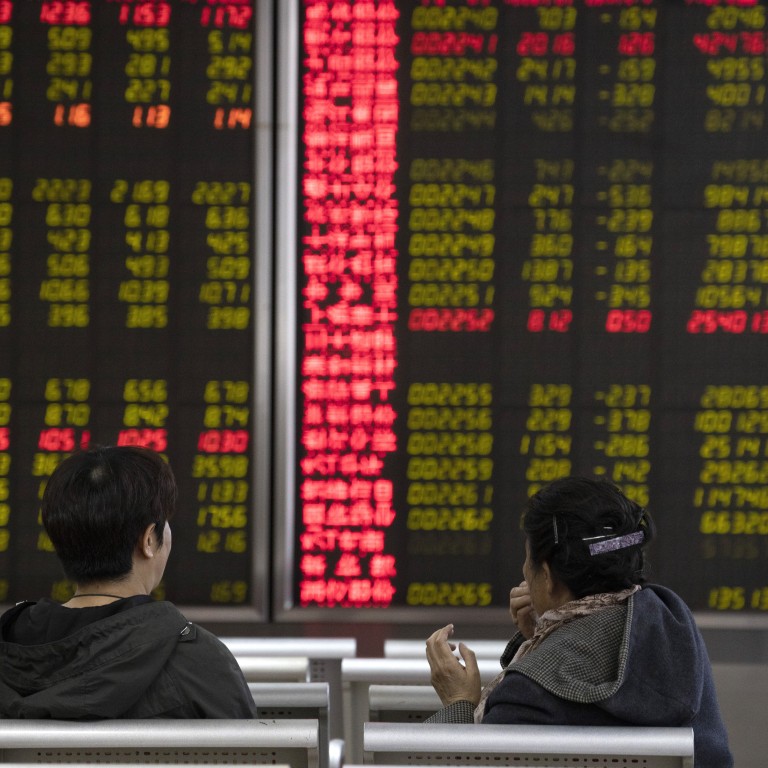
US air strike killing Iranian military leader weighs on trading sentiment in Hong Kong
- Gold, oil stocks benefit on heightened geopolitical concerns
- Kweichow Moutai drops 4.6 per cent
A US air strike that killed a top Iranian military commander weighed on investor sentiment, while boosting gold and oil stocks in Hong Kong and mainland China.
The Hang Seng Index finished Friday with a decline of 0.3 per cent at 28,451.50.
Meanwhile, the Shanghai Composite Index slipped less than 0.1 per cent, finishing at 3,083.79, after see-sawing between gains and losses. Liquor companies were top losers, while energy and communication services stocks gained.
Some analysts said the pullback in markets was likely temporary on the US strike news, as sentiment has been positive on easing US-China trade tensions and a move by the People’s Bank of China on January 1 to pump to US$115 billion into the mainland’s weakening economy.
The Shanghai and Hong Kong benchmarks have posted five straight weeks of gains.
“The tension in the Middle East is the major reason for the correction in the Hang Seng Index,” said Kenny Tang Sing-hing, chief executive of Royton Securities. “ … There is some profit taking pressure. But I think the market sentiment of the Hong Kong market is not too bad because you can see the market is still positive on the [PBOC move] in mainland China. So I think the correction is just short term. It is likely to hold support above the 28,000 level,” he said.
The Hang Seng has closed above 28,000 points for five straight sessions.
Looking ahead to next week, traders will watch for China’s release of inflation data.
On the mainland, benefiting from a spike in oil prices off of the US air strike, PetroChina rose 1.4 per cent to 5.95 yuan, China Petroleum & Chemical rose 1.9 per cent to 5.27 yuan, and Sinopec Oilfield Services gained 6.1 per cent to 2.4 yuan.
In Hong Kong, CNOOC rose 2 per cent to HK$13.24, PetroChina gained 2.8 per cent to HK$4.04, and China Petroleum and Chemical rose 1.5 per cent to HK$4.77.
Kweichow Moutai, the world’s most valuable liquor company, dropped 4.6 per cent to 1,078.56 yuan.
The Chinese liquor giant fell 4.5 per cent on Thursday after missing analysts’ forecast for full-year earnings.
Daiwa Capital Markets downgraded the liquor company – which soared 100 per cent in 2019 – to “hold” from “outperform” and lowered its 12-month target price to 1,100 yuan from 1,206 yuan.
But Louis Tse Ming-kwong, managing director of VC Asset Management said it was not time to panic on the stock.
“Kweichow Moutai has been growing tremendously over the past few years. Its share price has to be supported by good earnings,” Tse explained. “Bear in mind, the festive Lunar New Year season is coming and domestic consumption is bound to go up because it’s time for spending.”
Other liquor companies fell as well as some investors moved into tech-linked stocks on growing 5G enthusiasm. A gauge tracking Chinese liquor companies fell 1.1 per cent.
Gold stocks rose on the US-Iran tensions.
In the mainland, Shandong Gold rose nearly 5.7 per cent to 34.78 yuan, while Yintai Gold shot up 4 per cent to 14.17 yuan.
Shandong Gold Mining, a China gold miner and processor, jumped 5.4 per cent to HK$19.10, while Zhaojin Mining Industry, a Chinese gold miner and processor, climbed 5 per cent to HK$8.98.
Hang Lung Properties jumped nearly 5 per cent to HK$18.14 after Citigroup upgraded the stock to “buy” from “sell.”
Citigroup expects retail landlords and developers to benefit as Hong Kong’s retail could gradually recover in months to come.
“I think it’s better to view the stock as a proxy for China retail and consumption, rather than a Hong Kong retail property developer which has been hard hit by recent events,” said Phillip Zhong, senior equity analyst at Morningstar, who also has a positive view of the stock.
Index heavyweight Tencent rose 0.2 per cent to HK$383.
HSBC, which closed nearly a dozen branches and outlets of HSBC and its Hang Seng Bank subsidiary after they were damaged on New Year’s Day protests, fell 0.8 per cent to HK$60.40.
Meanwhile, Alibaba, the e-commerce giant and owner of the South China Morning Post, rose nearly 1 per cent to HK$212.
Additional reporting by Kathleen Magramo

